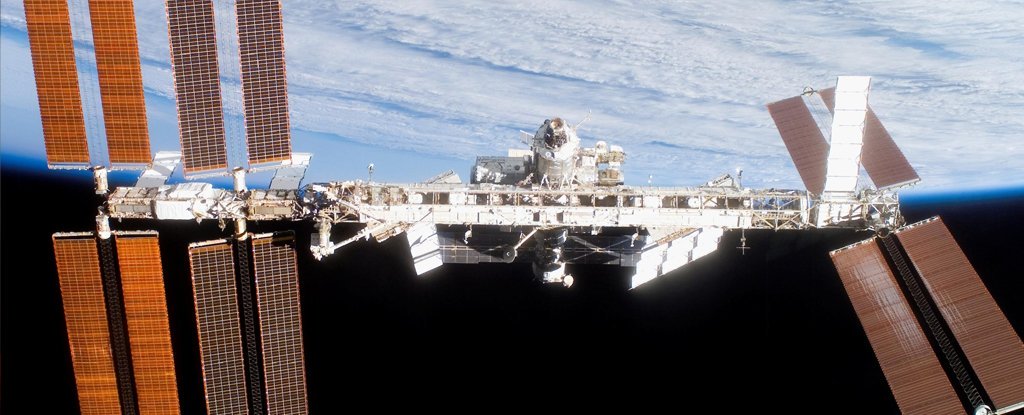实验显示,微重力似乎能中和大多数癌细胞
实验显示,微重力似乎能中和大多数癌细胞
There are a number of health risks that come with going to space. Aside from the increased exposure to solar radiation and cosmic rays, there are the notable effects that microgravity can have on human physiology.
太空旅行有很多健康风险。除了越来越多地暴露在太阳辐射和宇宙射线下外,微重力还会对人体生理产生显著的影响。
As Scott Kelly can attest, these go beyond muscle and bone degeneration and include diminished organ function, eyesight, and even changes at the genetic level.
正如Scott Kelly所证明的,这些不只是肌肉和骨骼的退化,还包括器官功能、视力甚至基因水平的改变。
Interestingly enough, there are also a number of potential medical benefits to microgravity. Since 2014, Joshua Choi, a senior lecturer in biomedical engineering at the University of Technology Sydney, has been investigating how microgravity affects medicine and cells in the human body.
有趣的是,微重力还有许多潜在的医疗益处。2014年以来,悉尼理工大学生物医学工程高级讲师乔舒亚·崔(Joshua Choi)一直在研究微重力如何影响人体内的药物和细胞。

Early next year, he and his research team will be traveling to the ISS to test a new method for treating cancer that relies on microgravity.
明年初,他和他的研究团队将前往国际空间站,测试一种依靠微重力治疗癌症的新方法。
According to Chou, the inspiration for his research came from a conversation he had with the late and great Stephen Hawking. During the conversation, Hawking remarked how nothing in the Universe defies gravity.
据周说,他的研究灵感来自于他与已故的伟大的史蒂芬霍金的一次谈话。在谈话中,霍金谈到宇宙中没有什么东西能抵挡地心引力。
Later, when a friend of Chou's had been diagnosed with cancer, he recalled what Dr. Hawking had said and began to wonder, "What would happen to cancer cells if we take them out of gravity?"
后来,当周的一个朋友被诊断出患有癌症时,他回忆起霍金博士所说的话,开始想:“如果我们把癌细胞从重力中取出,会发生什么?”
Simply put, cancer is a disease where cells begin dividing uncontrollably and spread to certain parts of the body and take them over. Cancer cells do this by coming together to form a solid tumor in the body, which then grows until the cells are signaled to invade healthy tissues – such as the heart, lungs, brain, liver, pancreas, etc.
简单地说,癌症是一种细胞开始不受控制地分裂并扩散到身体的某些部位并控制它们的疾病。癌细胞聚集在一起,在体内形成实体瘤,然后生长,直到细胞发出信号入侵健康组织,如心脏、肺、大脑、肝脏、胰腺等。
One of the biggest stumbling blocks with cancer research is that no one knows exactly when that point is reached. However, the process through which cancer grows and spreads would seem to indicate that there is a means through which the cells are able to sense each other and gravitate together to form a tumor.
癌症研究最大的障碍之一是,没有人确切地知道何时达到这一临界点。然而,癌症生长和扩散的过程似乎表明,存在一种方法,通过这种方法,细胞能够彼此感知,并相互吸引,形成肿瘤。
However, biomedical researchers do understand that the only way cancer cells could sense each other is through mechanical forces, and that those forces evolved to work in an environment where there's gravity. This motivated Chou to think of ways in which the lack of gravity might impede cancer cells' ability to divide and spread.
然而,生物医学研究人员确实明白,癌细胞相互感知的唯一方式是通过机械力,这些力在有重力的环境中进化而来。这促使周思考了缺乏重力可能阻碍癌细胞分裂和扩散的方式。
Chou has some experience in conducting space-based medical research. While working at Harvard, he took part in a project that resulted in the creation of a drug to treat osteoporosis. Part of their research took place aboard the International Space Station (ISS). As Chou explained:
周在进行天基医学研究方面有一些经验。在哈佛工作期间,他参加了一个项目,结果发明了一种治疗骨质疏松症的药物。他们的部分研究是在国际空间站上进行的。周解释的:
"This first experience of seeing how the space environment impacts our understanding of cell biology and disease progression inspired me to ask: 'Why can't we apply the same strategy to studying other cells and diseases?'"
“第一次看到太空环境如何影响我们对细胞生物学和疾病进展的理解,我不禁要问:‘为什么我们不能在研究其他细胞和疾病时采用同样的策略呢?’
Already, Chou and his team have tested the effects of microgravity on cancer cells in their laboratory. To do this, one of his graduate students created a device that is essentially a tissue box-sized container with a small centrifuge inside. The cells of different diseases are contained in a series of pods within the centrifuge, which then spins them up until they experience the sensation of microgravity.
周和他的团队已经在实验室里测试了微重力对癌细胞的影响。为了做到这一点,他的一个研究生发明了一种设备,基本上是一个纸巾盒大小的容器,里面有一个小型离心机。不同疾病的细胞包含在离心机内的一系列豆荚中,然后将它们旋转起来,直到它们体验到微重力的感觉。
As Chou indicated, the results were rather encouraging. "Our work has found that when placed in a microgravity environment, 80 to 90 percent of the cells in the four different cancer types we tested – ovarian, breast, nose and lung – were disabled," he said.
正如周所说,结果相当令人鼓舞。“我们的研究发现,当置于微重力环境中时,我们测试的四种不同癌症类型(卵巢癌、乳腺癌、鼻癌和肺癌)中80%到90%的细胞都是残疾的。”。
"By disabled, I mean they either die or float off because they can no longer hold on. Those four cancer types are some of the hardest cancers to kill."
“我说的残疾,是指他们不是死了就是漂走了,因为他们再也抓不住了。这四种癌症是最难治愈的癌症。”
Even more impressive is the fact that these results were obtained by simply altering the gravitational forces – i.e. without the help of drugs. When subjected to microgravity-conditions, the cancer cells were unable to sense each other and therefore had a very hard time coming together.
更令人印象深刻的是,这些结果是通过简单地改变引力而获得的,也就是说,没有药物的帮助。在微重力条件下,癌细胞无法相互感知,因此很难聚集在一起。
"Driving this mission has been a whole team effort – I feel very fortunate to be supported by my faculty and a group of very talented female engineering students who inspire me to keep going. They do so much of the hard work in making this project a reality."
“推动这项任务是整个团队的努力——我感到非常幸运,能够得到我的教员和一群非常有才华的女工科学生的支持,她们激励我继续前进。他们做了很多艰苦的工作,使这个项目成为现实。”
The next step, which will be happening early next year, will involve the team sending their experiment to the ISS aboard a specially-designed space module (SpaceX will be providing launch services). Chou and his colleagues will spend the duration of the experiment (seven days) on the ground, where they will monitor the experiment's progress and conduct live-cell imaging via data feeds.
下一步,将在明年初进行,包括团队将他们的实验发送到国际空间站上一个特别设计的空间模块(SpaceX将提供发射服务)。周和他的同事将在地面上进行为期7天的实验,他们将在那里监测实验的进展,并通过数据源进行细胞活体成像。
- 频道推荐
- |
- 全站推荐
- 推荐下载
- 网站推荐


















